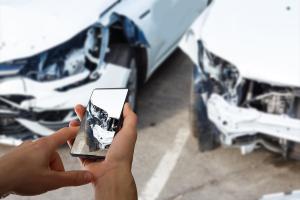01
August 2025
What are the most common car insurance scams in the UK?
Car insurance scams are on the rise and even if you aren’t involved in any, either as a victim or a perpetrator, it will be costing you in the form of higher insurance premiums.
Motor insurance shockingly makes up nearly two-thirds (59%) of all fraud cases, according to the latest data from the Association of British Insurers (ABI). The data shows that there were a total of 72,600 fraudulent claims in 2022 alone, which cost the industry around £1.1 billion. These costs are then passed on to drivers in the form of higher premiums. Over 50% of UK adults revealed their motor insurance has increased by up to £100 compared with the previous year - and this is partly down to insurance fraud.
But what are the most common car insurance scams? Here’s everything you need to know about car insurance scams, how to avoid them and more importantly - how to protect yourself if you find yourself unknowingly involved in one.
Motor insurance scams involve people making false claims against their insurance in order to receive a payout, and they’re getting more clever and elaborate. They come in many forms, from intentional scams that may involve other drivers and not being truthful on applications to accidental fraud. Here are some of the most common scams, and how you can avoid them:
Dumping your car
This usually involves someone hiding their car or damaging it on purpose, then making a claim on their insurance for the value of the car stating that it has been ‘stolen’. They may even sell parts of the car to pocket the extra cash.
“Crash for cash” or staged accident
A staged accident is where a driver or drivers will plan to have a car accident so they can claim on their insurance and split the money. A “crash for cash” scam involves a driver who deliberately causes an accident by crashing into another innocent driver or suddenly braking causing someone to crash into them. They’ll then make a claim against the other driver.
Insurance provider, Allianz, said its data showed that claims relating to this scam increased by 6000% last year - a significant jump from 50% the previous year.
These types of scammers may also make personal injury claims for conditions like whiplash, which are notoriously difficult to prove. However, recent reforms are making this particular claim more difficult and medical evidence is now needed for all whiplash claims.
How to avoid this - Always be suspicious when you’re out driving and don’t get too close to vehicles that seem to have stopped in the road for no reason. If you get yourself a dash cam for both the front and the back of your car, this can also help with proving liability in any claims.
Pre-inception loss
This is when someone will make a claim on their insurance for vehicle damage that happened before they were insured. This is to cover that they weren’t insured when it happened.
Exaggeration
Some people will try to exaggerate the damage from an accident to try and get more money. For example, they could say they’re more hurt than they are or say items that were worth a lot of money were involved in the accident. There is also a growing number of fraudsters using AI to fake photos, exaggerating damage on vehicles, and forging documents to try and scam money from insurers.
How to avoid this - If you’re involved in any accidents, always make sure to take your own pictures and videos as soon as possible. Installing a dash cam at both the front and back end of your vehicle can help make the claims process go smoothly as it can show your provider exactly what happened.
Ghost broking
This involves ghost brokers offering fake insurance policies to drivers looking for a good deal and generally targets young people or drivers with points on their licence who may have to pay more for their insurance. They will normally provide fake policy documents or buy a real insurance policy on the victim’s behalf but cancel it straight away. This has serious consequences for its victims as you could end up driving without insurance and get a fine or points on your licence.
How to avoid this - If a deal seems too good to be true, then it normally is. Ghost brokers often try to sell these policies on student websites, forums, marketplace websites or on social media. Always make sure to use a reputable price comparison site when looking for a new deal, making sure they’re regulated by the Financial Conduct Authority and double check your policy with the provider directly before exchanging details. Be wary of any broker only using the phone or email as a way of selling too. You can also check customer reviews to see if you can spot any red flags, and always remember to do your research.
If you’re unsure about the broker, check on the Financial Conduct Authority or the British Insurance Brokers’ Association website for a list of all authorised insurance brokers.
Compensation scams
We’ve all had them - calls from unknown numbers claiming that you’ve been involved in an accident. They’ll normally say you’re owed compensation and ask for personal details so they can pay it out. However, this is a scam, so it’s best to ignore them.
How to avoid this - Simply put the phone down and block the number. Even if you have been involved in a car accident, you should contact your own insurer and they’ll let you know what you need to do and when you’ll be hearing from them.
Fronting
It’s no surprise that young and inexperienced drivers pay more for their motor insurance premiums. Sometimes to combat these higher premiums, an older person, who never actually uses the vehicle, will falsely name themselves as the main driver on the insurance policy. This is known as ‘fronting’, however, this is illegal and classed as fraud. If you’re caught, you may get a hefty fine or even a criminal record.
Imaginary passengers
Some people will try and claim injuries for passengers who weren’t in the car at the time of the accident in the hopes of getting another payout. However, there could be serious consequences for anyone pretending they were in an accident.
Application fraud
It might be tempting to put false information, or bend the truth, in your insurance application to try and get cheaper insurance. However, if any information is found to be false, your claim could be rejected and policy cancelled. If any information is found to be false later down the line, like when you make a claim for example, it may invalidate the insurance policy completely and result in your provider not paying out.
Accidental fraud
Sometimes you might forget to update important details, like a change of address or where your car is parked. However, if your details change, it’s really important to let your insurer know. If you don’t, you could risk invalidating your insurance policy.
What happens if you’re caught committing motor insurance fraud?
If you’re caught committing insurance fraud, or any details are found to be incorrect when you go to make a claim following an accident, then there can be serious consequences:
Your policy may be ‘voided’: This means that your insurer will cancel your policy altogether and treat it like it didn’t exist. While this may not seem that serious - it is. Not only could it make it more difficult to find cover in the future, but those who do cover drivers who have had their policies cancelled will charge a lot more. This helps to keep costs down for genuine customers.
You could get points on your licence and a fine: If you haven’t been honest about anything in your claim or your insurance details, then your policy may be seen as ‘invalid’. This technically means that you’re not insured, so your vehicle can be seized and impounded. This also results in six points on your licence plus a fine.
Your claim will be denied: If any details are found to be incorrect following an accident or claim, then your provider may not pay out. This means you’ll have to cover any costs yourself and in some cases, you may even need to pay the other driver’s costs, which can all add up.
How can you protect yourself if you’re unknowingly involved in a motor insurance scam?
There are some things you can do to make sure this doesn’t happen to you, and also some things you should do if you feel you’ve been the victim of a motor insurance scam. They are:
Buy direct from an insurance website
If you’re being offered an insurance deal in person, over the phone or via social media, then it could be a ghost broking scam. They will sometimes pretend to be from a genuine insurance company or claim to have connections with one, offering you what looks like a great deal.
The only way to be certain is by getting a policy through a regulated insurer. If you’re ever worried, leave it and check with the company directly before signing anything or handing over any money or personal details. You can even check whether the broker exists by checking the Financial Conduct Authority or the British Insurance Brokers’ Association website for a list of all authorised insurance brokers.
Get a dash cam
A dash cam is a camera that records the road around you as you’re driving and can help prove who was at fault if you’re involved in an accident. It can be especially useful if you think that the accident was deliberate.
Keep your details up to date
To avoid an accidental insurance scam, always make sure that your details are up to date as this can prevent any issues when you come to make a claim.
Contact the Insurance Fraud Bureau
If you think you’ve been the victim of insurance fraud then you’ll need to contact the Insurance Fraud Bureau as soon as possible, as well as your insurer. You can also contact the police on 101, unless it’s an emergency in which case you should call 999.
Remember - you may not always be able to claim your money back so it’s important to make sure that you’re aware of all the different scams out there to avoid becoming a victim in the first place.





